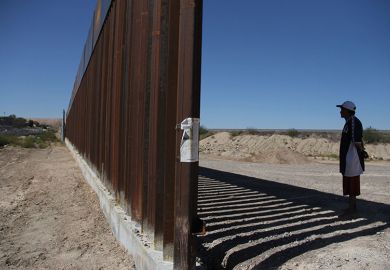Mexican universities are reorienting to the East, as shifting geopolitical currents and a volatile northern neighbour draw their attention across the Pacific.
A technologically focused university headquartered less than a mile from the US border is among those escalating its engagement with eastern Asia through student mobility, visiting lectureships, shared courses, internships and dedicated institutes.
Mexicali-based CETYS Universidad says that it is part of a trans-Pacific pivot that is motivated by the need to internationalise, and is rooted in 19th-century historical links. The trend has been strengthened by a remarkable boom in engineering study and the presence of multinational companies from Japan, South Korea, Taiwan and China.
But it is also a reaction to increasing strains on the relationship with the US thanks to tit-for-tat tariffs, an immigration crackdown and President Donald Trump’s demands that Mexico bankroll a border wall.
“The collaboration with China preceded current moves on the part of the US government, but the US government’s measures will make Mexico and other countries look elsewhere,” said CETYS Universidad president Fernando León-García.
“The Asia-Pacific [region] is definitely going to see a lot more activity with Mexico. It’s not recent, but it will intensify.”
Mexican engagement with China dates from the 1600s, when Chinese immigrants arrived as servants of Spanish merchants. It picked up in the late 19th century, particularly after the US barred Chinese migrants in 1882.
Mexico recruited Chinese people to build its railroads and, in 1899, signed a treaty to draft Chinese farm workers for its northern border areas. By the 1920s, the Chinese were Mexico’s second-largest immigrant group after Spaniards.
Now the tables have turned, with a surge in Mexican engineering education – including a tripling of graduate numbers between 2008 and 2012 – fuelled by the skilled labour demands of the local branches of Asian multinationals.
Dr León-García said that demand was particularly high in aerospace, medical equipment and electronics. He said that CETYS had started transforming its engineering programmes a decade ago – initially by partnering with US universities that undertook research and development for the multinationals, and more recently by working with the companies themselves.
He said that collaborations with firms such as Chinese white goods giant Hisense, Hong Kong-based TPV, Japan’s Panasonic, South Korea’s Samsung and Taiwan’s Foxconn had also generated opportunities for students, including scholarships and graduate employment.
CETYS has also picked “strategic” institutional partners in eastern Asia. In China, they include aerospace specialists Northwestern Polytechnical University in Xi’an, Hunan Normal University in Changsha and the University of International Business and Economics in Beijing.
Dr León-García said that CETYS had sent more than 100 students a year to China since 2015, along with some of its professors. Chinese, South Korean and Japanese academics had also been attracted to forums featuring Asian business interests and diplomats in Mexico.
Meanwhile, the university plans to establish three centres for China-Mexico studies in China over the next 12 months, to complement the Asia-Pacific Institute it hosts in Tijuana. Dr León-García said that such proposals were part of an internationalisation strategy that went beyond student mobility and focused on key regions of the world.
“With China in particular, we are not waiting for something to be established here,” he said. “To have a global and diverse perspective, we need to make sure that we have beachheads in strategic parts of the world. China has to be part of the opportunities you offer students.”
POSTSCRIPT:
Print: Mexico turns to Asia in Trump era
Register to continue
Why register?
- Registration is free and only takes a moment
- Once registered, you can read 3 articles a month
- Sign up for our newsletter
Subscribe
Or subscribe for unlimited access to:
- Unlimited access to news, views, insights & reviews
- Digital editions
- Digital access to THE’s university and college rankings analysis
Already registered or a current subscriber?








